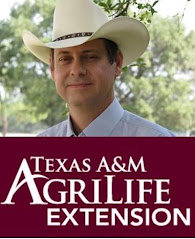The Texas AgriLife Extension Service, Texas Department of Agriculture, and Texas Commission on Environmental Quality has organized a regional collection of unwanted or unused (waste) pesticides as part of the Agricultural Waste Pesticide Collection Program.
The local event will be held on Thursday, October 28, 2010 from 8:00 a.m. to 1:00 p.m. at the San Patricio County Fairgrounds located at 219 W. 5th Street in Sinton, Texas.
This free collection, conducted rain or shine, will give agricultural producers who use pesticides in Texas an opportunity to dispose of unwanted products that may pose a hazard to them, their families, and their surrounding farming and ranching communities. The program is strictly voluntary and no one is required to participate. All this is done at no expense to them.
The participants do not have to identify themselves. However, there is a short survey in which the participants are asked to complete.
These items are accepted at the collection events; triple rinsed - empty pesticide containers, insecticides, fungicides, rodenticides, nematicides, bactericides, growth regulators, harvest aid chemicals, pesticides used on livestock, other miscellaneous pesticides, all formulations of herbicides, unknown substances (please label the container "unknown"), used motor oil and oil filters, lead-acid batteries, paint, petroleum products, batteries, and antifreeze.
Correctly using these agricultural pesticides and safely recycling, reconditioning, or disposing of the empty containers is a must for all agricultural users. Proper use and management practices can help keep you and others safe. Unusable or waste pesticides can be disposed of at regional waste pesticide collections. However, there are limited options for disposing of pesticide containers.
Currently, properly rinsed agricultural chemical containers are not classified as hazardous waste, and in many cases, are disposed of in sanitary landfills. However, due to limited capacity problems and more stringent state regulatory requirements, many landfills have already begun to refuse these containers. Other methods once used to destroy these containers, such as burning or burying them, are no longer viable disposal options. In Texas, open burning of pesticide containers is illegal and disposal at specially designed incineration facilities is often too costly for the average applicator.
Burying these containers may lead to serious environmental consequences, such as groundwater contamination. Today, many environmentally concerned land developers, buyers, and lenders require that environmental audits be conducted on a property before it is purchased or sold. For these reasons, burying agricultural chemical containers is not recommended.
Disposal options for empty agricultural chemical containers are becoming more limited in Texas, so government and industry are promoting and researching alternatives such as recycling.
Agricultural chemical containers come in many shapes and sizes and may be made of paper, metal, or plastic. Empty paper containers cannot be reconditioned or recycled; take them to an authorized incinerator or landfill. Metal and plastic containers can be reconditioned or recycled if they are properly rinsed.
Rinsing containers is required by law, but it is a simple, essential step before they can be recycled or disposed. Rinsing them can minimize health and environmental risks, as well as save money by ensuring that none of your agricultural chemical product is wasted.
The upcoming Ag waste collection is open to Texas residents who apply pesticides or other agricultural chemicals for the production of agricultural products in Texas or for those residents that have banned or unwanted agricultural chemicals. For more information contact the San Patricio County Extension Office at 361-364-6234 or TCEQ at 512-239-3100.
Tuesday, October 19, 2010
Subscribe to:
Posts (Atom)

